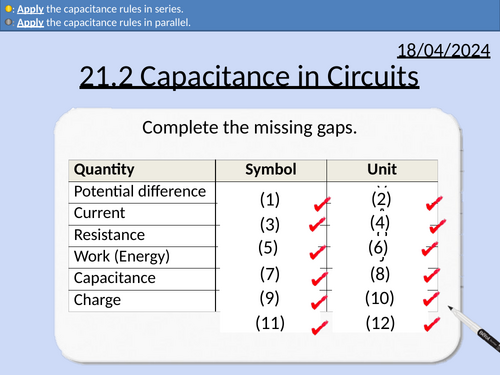OCR A level Physics: Capacitance
OCR A level Physics: Chapter 21 Capacitance is apart of the Module 6: Particle and Medical Physics
All presentations come with worked examples, solutions and homeworks.
21.1 Capacitors
21.2 Capacitors in circuits
21.3 Energy stored by capacitors
21.4 Discharging capacitors
21.5 Charging capacitors
21.6 Uses of capacitors
* Electrical quantities, symbols, and units
* SI prefixes and standard form
* Definition of a capacitor
* Structure of a capacitor
* Calculating capacitance, charge, and potential difference.
* Uses of capacitors in circuits.
* Rules for capacitors in parallel (potential difference, charge, and capacitance).
* Rules for capacitors in series (potential difference, charge, and capacitance).
* Applying the rules in series and parallel.
* Creating a circuit to calculate the charge stored on the capacitor.
* Work done of a capacitor depends upon the initial potential difference and capacitance.
* Work done is provided by the source of potential difference.
* Deriving three equations for work done of a capacitor.
* Exponential increase and exponential decay
* Explaining how capacitors discharge through a resistor in parallel
* Definition of time constant for a capacitor
* Showing that time constant has units of seconds
* Iterative method for finding how capacitors discharge
* Using exponentials and logs.
* Solving a differential equation (needed for A-level Maths).
* Explaining how capacitors charge with a resistor in series
* Explaining how 𝑉, 𝐼, or 𝑄, change with time 𝑡 for a charging capacitor.
* Sketching graphs for 𝑉, 𝐼, or 𝑄, after time 𝑡 for a charging capacitor.
* Calculating 𝑉, 𝐼, or 𝑄, change with time 𝑡 for a charging capacitor.
* Calculating power output from a circuit containing a capacitor
* A rectifier circuit - changing an alternating input to a smooth output

